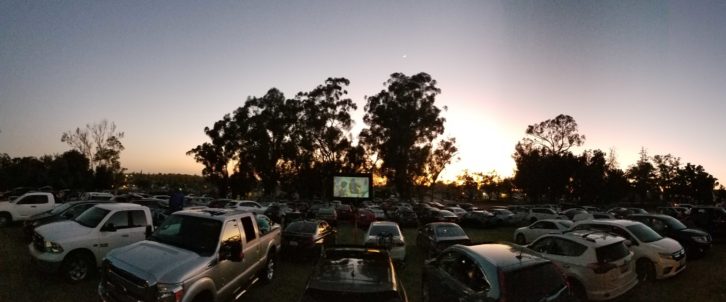
At a time when movie theaters can be impractical, people are still in great need of entertainment. Orange County, CA-based non-profit art house cinema, The Frida Cinema, has capitalized on this demand. Mixing a little old world with new world, they created a roaming pop-up drive-in screening series fit for the twenty-first century.
I attended a showing of Monty Python and the Holy Grail at the Zion Lutheran Church and School in Anaheim. Even under the stars, the heat was overwhelming and I found myself quite content to not have to leave my car. Despite the spacious lot being entirely full just prior to the film starting, there was still ample room to get out and stretch your legs without fear of encroaching upon your neighbors. Some people had come prepared and were lounging on their open tailgates while others queued up for vendors selling snacks. The liveliness of a crowd—even one confined to individual vehicles, looking up at a massive, projected John Cleese—was a presence I had greatly missed.
In keeping with the classic format, the movie’s audio is streamed over FM radio. The Frida Cinema has their own FM transmitter and antenna and uses an unused/”dead” frequency based on event location. Every car simply turns on their radio to the designated station and the car speakers do the rest. The church hosting the event was located on a somewhat busy street but with the audio filling the car, it was entirely forgotten.
To address the crowd’s visibility, presenters used a 40ft Harkness cinema screen and Epson provided a Pro L1755UNL projector. Epson had been interested in doing post-lockdown entertainment, and their contribution to The Frida Cinema proved invaluable to the pop-up mission. I was nervous about the visual quality of projecting a movie as old as Monty Python and the Holy Grail under these potentially challenging circumstances but was pleasantly surprised by the clear image before me.
Given the alternating venues that The Frida Cinema employs, flexibility is a big factor for the projection setup. The Harkness screen is inflatable which helps with transportation and they use Blu-ray disks to show their wide range of films. The 120V requirement of the projector (opposed to the standard 220V) makes repeated installation significantly simpler as well. The other venue-specific complications to a good showing are mostly handled by the advanced features of the projector, according to Logan Crow, Executive Director of The Frida Cinema.
The Pro L1755UNL’s capabilities enable it to accommodate the changing circumstances. In residential areas there were ambient light concerns but, at 15,000 lumens, the projector had no trouble producing a clear image. It even managed to do this without a black backing on the screen. Epson’s Ramzi Shakra informed me that the projector also has ten lenses, nine of which have zoom. Depending on the venue and whether they’ve decided to have the projector in front of the audience or behind, they’ll use the short-throw and long-throw lenses respectively.
This setup allows The Frida Cinema to share their love of films safely with an audience in need of innovative ways to have fun. It certainly pays homage to the beloved drive-in movies of the ‘50s however holds its own in the tech-savvy 2020s. —Jess Bowie










